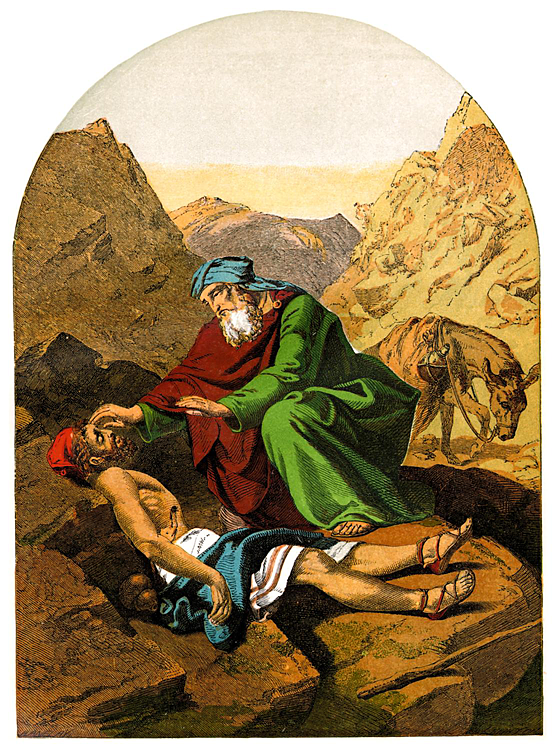With Friends Like These ...

While many sentient races care for their sick and try to prolong their lives, other races ... don't.
A little more than four years ago, Eris Lis, M.D., began writing a series of brilliant and informative posts on RPGs through the eyes of a medical professional. Following is the seventh of them, which appeared here on January 19, 2013.
There's a recurring joke in Insults & Injuries which pops up during discussions of different races' perceptions of disease. Specifically, the joke is made in relation to various evil races, and at least a passing nod is used in reference to goblins and orcs, but my personal favourite time is in conjunction with giants. I quote briefly from the book:
"Non-giants rarely see sick giants because sick giants die alone if they are lucky and surrounded by other giants if they are not."
The implication, obviously, is that while many sentient races care for their sick and try to prolong their lives, other races... don't. Let's not over-simply, however. It's easy to imagine that evil races are the ones who prey on their own people, and good races offer healing and succor to the needy, but is that really the case? As with all good and interesting questions, the answer is: it's complicated.
Let's start with an easy example: the giants listed above. We can politely ignore the fact that according to the various SRDs, not all giant races are evil (a little bit of over-simplification doesn't hurt too much, after all). We assume that in this example, the giants are nasty and brutish, and that their reaction to a weak and defenseless neighbour is to kill it and take its stuff. Evil race, low intelligence and wisdom scores in the general population, and a culture that embraces a very strict Darwinian code means that doctors are in short supply and low demand, and the cause of death for almost all giants is violence.
Now let's make things a bit more complicated, and look at orcs. Orcs are another evil race, one which may or may not be "honourable" depending on the flavour of a campaign world. In your standard fantasy setting, the orcs are barbaric warriors who raid and pillage to get what they want and who wouldn't hesitate to kill a defenseless foe. In many fantasy settings, though orcs are also known for a strong shamanistic tradition, and shamans could mean healers. When an orc in this sort of setting gets sick, depending on the game master, it might be quickly killed by its fellows -- after all, what good is an orc who can't defend itself? -- or, conceivably, a shaman might heal it. The orcs aren't mindless brutes; they might recognize that they need living orcs to bolster their raiding parties, or they might not want to lose a prize storyteller, or maybe the orc in question owes the chief money and he doesn't get to die until he's repaid it. There are any number of reasons why an evil race might still embrace healers and medicine.
Now let's look at it the other way: why would an intelligent race choose not to heal their sick? As fun as it is to consider fantasy examples, this is a case where history can enlighten us. Consider the Spartans, one of history's greatest and most successful militaristic societies. The Spartans had healers and physicians who helped to keep their people alive, but their health care system had one well-known gap: an unfortunate lack of pediatricians. A newborn Spartan was brought before a council of elders and judged, and babies who were unworthy, usually but not always because they were small, weak, of deformed, were thrown off of a cliff. By modern Western standards, it's quite a horrific practice (although similar practices probably continue to be used today in several parts of the world). Can you really call the whole Spartan race "evil?" Certainly, they lived in a different era, with different beliefs and values, but then again, so do orcs, and we judge them quite readily. The point is, a nation can have a lot of very good qualities and still not necessarily take care of its sick and wounded.
Obviously, I'm a bit biased in terms of my interests and knowledge base, but personally, whenever I'm creating a new race, nation, or people, one of the first things I work out is their approach to healers and healing. Wholly independent of things like "good" and "evil," once you know how a group treats its sick, a lot of the rest of their culture can fall into place.

